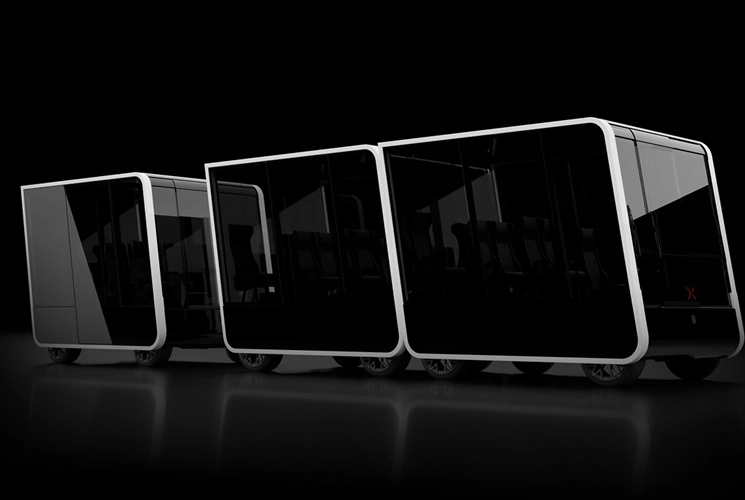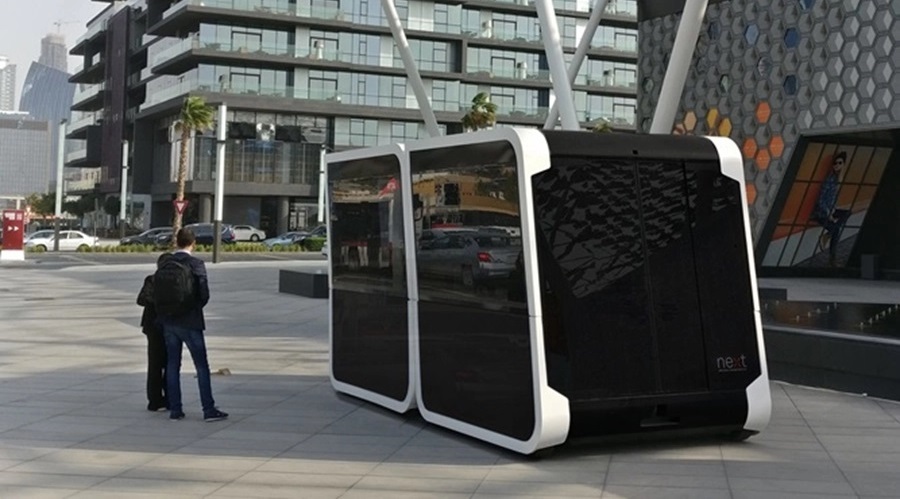NeXT, a company founded in 2017, is revolutionizing the public transportation sector with a new and innovative vehicle, considered “the shortest bus available in the market.”
This modern invention functions as a standalone and cubic taxi, but with the difference that it can couple with other units and form a bus type of vehicle.
“The two most innovative factors of the product are the shape, which saves space, and the modularity, which allows each pod to move individually or together with others,” comments Tomaso Gecchellin, founder of NeXT, during a webinar organized by Sustainable Bus Tour.
“When you have five units coupled, you have more capacity than a typical 12-meter city bus, thus allowing it to accommodate up to 80 passengers,” details Gecchellin.
NeXT claims that the transition to this mode of transportation would represent an 80% traffic reduction in cities.

In addition to its use as a bus, it can also be used as a VIP transport in its isolated unit mode and as a means of transporting multiple types of cargo.
However, the benefits of this creation are not only about space liberation.
The design of the pods allows for a 50% reduction in costs compared to public transport such as conventional buses, as it represents a lower investment in infrastructure.
This is due to its redistribution logistics in motion, allowing units to change direction according to user convenience and then realign when necessary.
Moreover, it implies up to 75% less energy consumption compared to electric buses.
Company origins and objectives. What’s next with NeXT?
During the webinar, Tomaso Gecchellin also recounts the brand’s beginnings and explains its motivations.
“At first, my goal was to optimize transportation, reduce traffic, decrease consumption, and cost for users,” comments the industrial designer.
The company, born in Padua, Italy, has been around for over six years and currently has 18 employees.
When asked about its main markets, Gecchellin highlights that “the most important is in Dubai, in the Middle East, specifically with the VIP mode, a non-stop shared taxi system.”
“They work like a swarm of taxis that can couple, and people can move between them freely when they are connected,” says the founder.
On the other hand, a crucial issue for the brand’s expansion and better development is global legislation regarding autonomous driving.
“Modularity is applicable right now with immediate benefits before self-driving becomes legal,” NeXT describes on its official page.
For now, the pods must be driven by an operator, but it projects that legislative implementations will change shortly.
Furthermore, it indicates that the second most relevant market is Europe.
“Here, we are focusing more on the bus mode, which can also vary and modify its capacity according to demand,” explains Gecchellin.
Looking towards the future, the industrial designer states, “we hope to distribute it to different destinations soon.”
Other examples of autonomous buses
Legislative obstacles not only pose a hindrance for NeXT, but for all producers trying to enter new markets to diversify the presence of their vehicles.
A relevant example is Karsan, a Turkish company specializing in commercial buses with electric versions, low consumption, and/or autonomous capabilities.
Founded in 1966, the company, with a long tradition in its country, is highly committed to sustainable mobility and ecosystem well-being.
In May of last year, the Turkish company launched the first unit of its E-Tak in Norway, marking the milestone of a driverless passenger vehicle roaming the streets of the European continent.
However, the company faces challenges when trying to enter countries like Spain, where legislation in this regard is less flexible.
In this regard, Angel Estrella, the company’s representative in Spain, states that “more agile rules that respond to what is happening are necessary. Why can it be done in Norway and not here?”.






